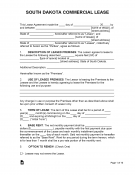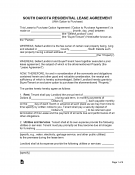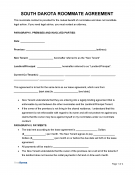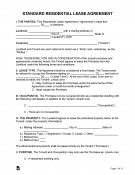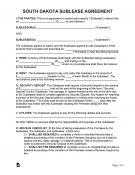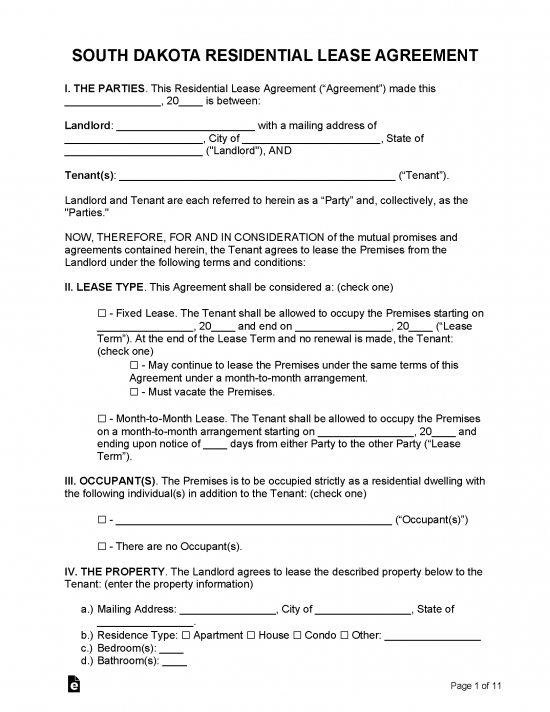South Dakota lease agreements are contracts that set the terms of a lease of property in exchange for rent. The agreement must be written, signed by both the landlord and the tenant, and contain the amount of the rent. They will also contain other terms that will vary depending on the property, such as whether smoking is permitted. Both parties should keep a copy of the agreement and refer to it to determine their obligations under the lease.
Contents
By Type (6)
- Commercial Lease Agreement
- Month-to-Month Lease Agreement
- Rent-to-Own Lease Agreement
- Roommate Lease Agreement
- Standard Lease Agreement
- Sublease Agreement
Download: Adobe PDF, MS Word, Rich Text Format
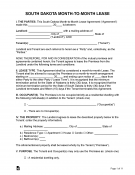 Month-to-Month Lease Agreement
Month-to-Month Lease Agreement
Download: Adobe PDF, MS Word, Rich Text Format
Download: Adobe PDF, MS Word, Rich Text Format
Download: Adobe PDF, MS Word, Rich Text Format
Download: Adobe PDF, MS Word, Rich Text Format
Download: Adobe PDF, MS Word, Rich Text Format
Landlord-Tenant Laws
Statutes – Title 43, Chapter 32 (Leases of Real Property)
Required Disclosures (2)
Lead-Based Paint Disclosure – If the property to be leased contains a dwelling unit built before 1978, federal law mandates that the landlord address the dangers of lead-based paints.
Methamphetamines – If a landlord knows that methamphetamines were previously manufactured at a property, then the landlord must inform the tenant. (§ 43-32-30)
Security Deposit Laws
Maximum Amount ($)
Landlords may not demand a security deposit greater than one (1) month’s rent. However, in cases where certain conditions of the property create greater risks to maintaining the premises, then the parties may negotiate a larger deposit. (§ 43-32-6.1)
Returning to Tenant
Landlords must return security deposits to tenants within two (2) weeks of the termination of the tenancy and the tenant providing a new mailing address or delivery instructions. A landlord may retain a portion of the security deposit to account for unpaid rent or to return the premises to their condition before the tenancy began, excepting normal wear and tear.
If the landlord plans to retain an amount from the security deposit, the landlord must provide the tenant with a written itemization of all deductions within forty-five (45) days of the termination of the tenancy. (§43-32-24)
When is Rent Due? (grace period)
Because there is no state law mandating a rent due date or grace period, rent is due on the day named in the lease agreement.
Eviction Notice (non-payment)
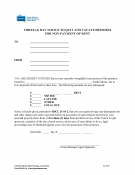 3-Day Notice to Pay or Quit – If a tenant does not pay rent on the date it is due, the landlord has the right to deliver this notice to the tenant, informing the tenant of the landlord’s right to terminate the lease and initiate eviction proceedings if the tenant then fails to pay the rent owed within three (3) days from the day the notice is provided. (§21-16-1)
3-Day Notice to Pay or Quit – If a tenant does not pay rent on the date it is due, the landlord has the right to deliver this notice to the tenant, informing the tenant of the landlord’s right to terminate the lease and initiate eviction proceedings if the tenant then fails to pay the rent owed within three (3) days from the day the notice is provided. (§21-16-1)
Download: Adobe PDF
Maximum Fees ($)
Late Rent Penalties
South Dakota law does not set a limit on how much landlords can charge as a fee for delivering rent late. However, in order to ensure that the fee is enforceable, landlords should name the fee in the lease agreement.
NSF Checks
South Dakota law does not set a fee that landlords may impose on tenants for providing an NSF rent check. However, South Dakota law does make it a crime to provide a check linked to an account with insufficient funds to cash it, when the writer of the check knows there is not enough money.
Tenant’s Unclaimed Property
If a landlord finds personal property on a premises after the tenant has moved out, and the personal property appears to be worth more than $500, then the landlord must store the property.
The tenant may reclaim the property from storage, but must reimburse the landlord for the cost of storage. If the tenant fails to reclaim the property within thirty (30) days, then the landlord may dispose of the property. (§ 43-32-26)
